Piano Makers in Russia in the
Nineteenth Century
Piano Makers in Russia in the
Nineteenth Century
Anne Swartz
LEHIGH UNIVERSITY PRESS
Bethlehem
Published by Lehigh University Press
Copublished by The Rowman & Littlefield Publishing Group, Inc.
4501 Forbes Boulevard, Suite 200, Lanham, Maryland 20706
www.rowman.com
16 Carlisle Street, London W1D 3BT, United Kingdom
Copyright 2014 by Anne Swartz
All rights reserved. No part of this book may be reproduced in any form or by any electronic or mechanical means, including information storage and retrieval systems, without written permission from the publisher, except by a reviewer who may quote passages in a review.
British Library Cataloguing in Publication Information Available
Library of Congress Cataloging-in-Publication Data
Swartz, Anne, 1944
Piano makers in Russia in the nineteenth century / Anne Swartz.
pages cm
Includes bibliographical references and index.
ISBN 978-1-61146-158-9 (cloth : alk. paper)ISBN 978-1-61146-159-6 (electronic) 1. Piano makersRussiaHistory19th century. 2. Piano makersRussiaHistory20th century. 3. PianoConstructionRussiaHistory19th century. 4. PianoConstructionRussianHistory20th century. 5. MusicSocial aspectsRussia19th century. 6. MusicSocial aspectsRussia20th century. I. Title.
ML507.5.S93P53 2014
786.2'194709034dc23
2014012220
 TM The paper used in this publication meets the minimum requirements of American National Standard for Information Sciences Permanence of Paper for Printed Library Materials, ANSI/NISO Z39.48-1992.
TM The paper used in this publication meets the minimum requirements of American National Standard for Information Sciences Permanence of Paper for Printed Library Materials, ANSI/NISO Z39.48-1992.
Printed in the United States of America
For a long time, both here and abroad, I have dedicated myself to perfecting the piano, and my continual efforts have finally led me to successful results. I have succeeded in constructing an altogether new type of grand piano. In 1839 I obtained a ten-year privilege for the manufacture from His Majesty the King of Bavaria. My experiments have resulted in heavy financial sacrifice. Although well respected in my country, I was determined to travel to St. Petersburg, where I hoped to find a much wider sphere of activity.
Iakov Davidovich Bekker, Journal de St.-Ptersbourg, November 7/19, 1844
Acknowledgments
This book could not have been conceived and written without the support of many scholars and institutions. All those who treasure the piano as a significant part of Russias cultural history have generously supported various aspects of this project with financial support and shared photographs of these rare instruments. This project began with grants from the National Endowment for Humanities (Summer Stipend Program, Travel to Collections, and Special Opportunity for Archival Research Program), the Kennan Institute of the Woodrow Wilson International Center for Scholars, the International Research and Exchanges Board, the American Council of Learned Societies, and the City University of New York Research Award Program, for supporting research trips to St. Petersburg, Russia, and Washington DC to complete this book. All of the above agencies have generously supported my research in the archives and rare-book collections, and I am deeply grateful for their encouragement of my research. It gives me great pleasure to present my findings on Russian piano history in this book, and I hope that it provides a foundation for future scholars in music and related fields. For their assistance, I also extend thanks to James Billington, Librarian of Congress; Faina Davidovna Bartnovskaia, Natalia Ramazanova Vasilevna, and the staff of the National Library of Russia; and the staff of the music library of the St. Petersburg N. A. Rimsky-Korsakov Conservatory. I also wish to thank Dr. Irena Poniatowska and the staff of the music division of the Biblioteka Narodowa, Warsaw, for their kind assistance with rare materials.
I am deeply indebted to the staff of the Library of Congress, Performing Arts Division, for their assistance with the retrieval of the holdings in the music collection. I also wish to express my appreciation to the librarians and staff who made available the materials from the Russian Imperial Collection, the Rare Books and Special Collections Division, and the European Divisions Russian and Ukrainian Pamphlet and Brochure Collection: 18661949. I want to thank Dr. Blair Ruble, vice president for programs at the Wilson Center and senior advisor to the Kennan Institute, and the entire staff of the Kennan Institute Library for giving me the opportunity to study the rare volumes housed in the institutes Simmons Russica Collection.
Many people helped with this project in a variety of ways. The scholars who attended the annual conferences of the British Association for Slavonic and East European Studies at Cambridge University offered helpful suggestions for this book in its initial stages. I thank Professor Scott Paul Gordon, director of Lehigh University Press, for his belief in the project, for his encouragement, and for shepherding the book through the publication process. I also want to thank Professor Monica Najar, who served as director of Lehigh University Press in the initial stages of this project, for her support of my scholarly work. I wish to thank Jim Wade for his thoughtful editing of the manuscript and for his insightful comments on the books narrative. I thank Anne Beetem Acker for sharing her expertise and her research on rare keyboard instruments and for her encouragement of my project from its earliest stages. I want to express my deepest appreciation also to Dr. Inger Jakobsson-Wrn, curator of the Sibelius Museum, for granting permission to publish the photographs of the rare Tischner grand piano restored in the museums workshops. I also want to acknowledge Dr. Johannes Brusila, former curator of the Sibelius Museum, for his assistance in acquiring the Tischner piano photographs for my public lectures. For graciously sharing with me the photographs of the Strobl upright piano and for his good will, I thank Denys Vasylyev, musicologist and piano historian of the Zaporozhye State Ethnography Museum in Zaporozhye, Ukraine. I also wish to thank Alexandra Shtarkman of the St. Petersburg State Museum of Theatre and Music and Dr. Natalia Gorbunova of the Tchaikovsky State House-Museum for sharing information concerning the rare pianos housed in the collections of these treasured national museums.
At Baruch College, I would like to thank the staff of the William and Anita Newman Library, President Mitchel Wallerstein, Dean Jeffrey Peck and the staff of the Weissman School of Arts and Sciences, Provost David Christy, and my colleagues in the Department of Fine and Performing Arts for their support of my work. I am also grateful for the many debates and discussions on Russian music, history, and literature with my colleagues from the Columbia University Seminar on Slavic History and Culture. I wish to thank Annie Hemingway for the translations of the French texts. The Russian translations are mine. Transliterations of the Cyrillic alphabet are based on the 1961 Harvard system. The names of some nineteenth-century Russian composers, such as Tchaikovsky, have been spelled in the Western manner. Dates are given according to the Julian, or Russian, calendar, except where the author or editor employs Julian and Gregorian dates. In those instances, both dates are provided as in the original source. During the nineteenth century, the Julian calendar was twelve days behind the Gregorian calendar.
This book complements several recently published books on Russian arts and technology, history and culture by providing fresh insights into the deep impact of the piano in that country and the significant role of neglected piano artisans in the history of music in nineteenth-century Russia. It owes a great deal to the scholarship of those who have published works on piano history and the enduring role of the piano in contemporary society, and I want to acknowledge here their pioneering research. Iakov Moiseevich Uchitels original study,
Next page
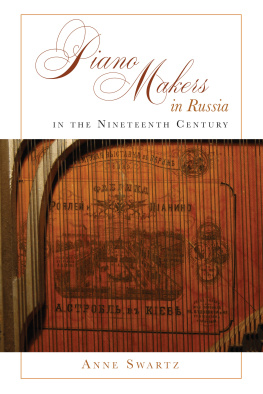
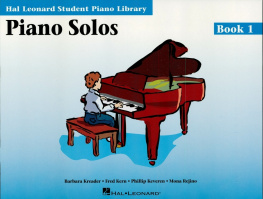
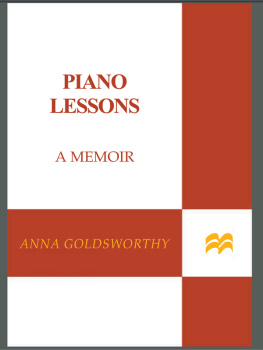



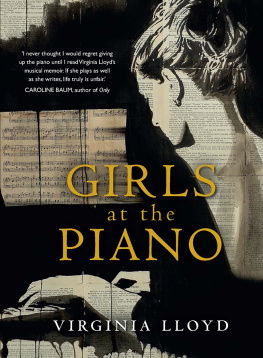
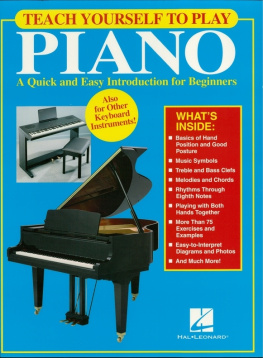

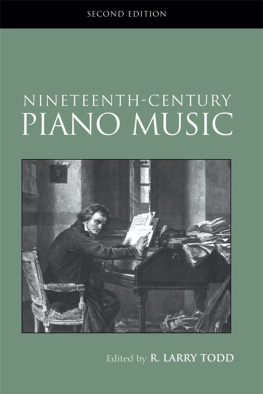
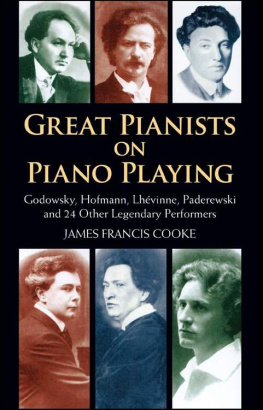
 TM The paper used in this publication meets the minimum requirements of American National Standard for Information Sciences Permanence of Paper for Printed Library Materials, ANSI/NISO Z39.48-1992.
TM The paper used in this publication meets the minimum requirements of American National Standard for Information Sciences Permanence of Paper for Printed Library Materials, ANSI/NISO Z39.48-1992.